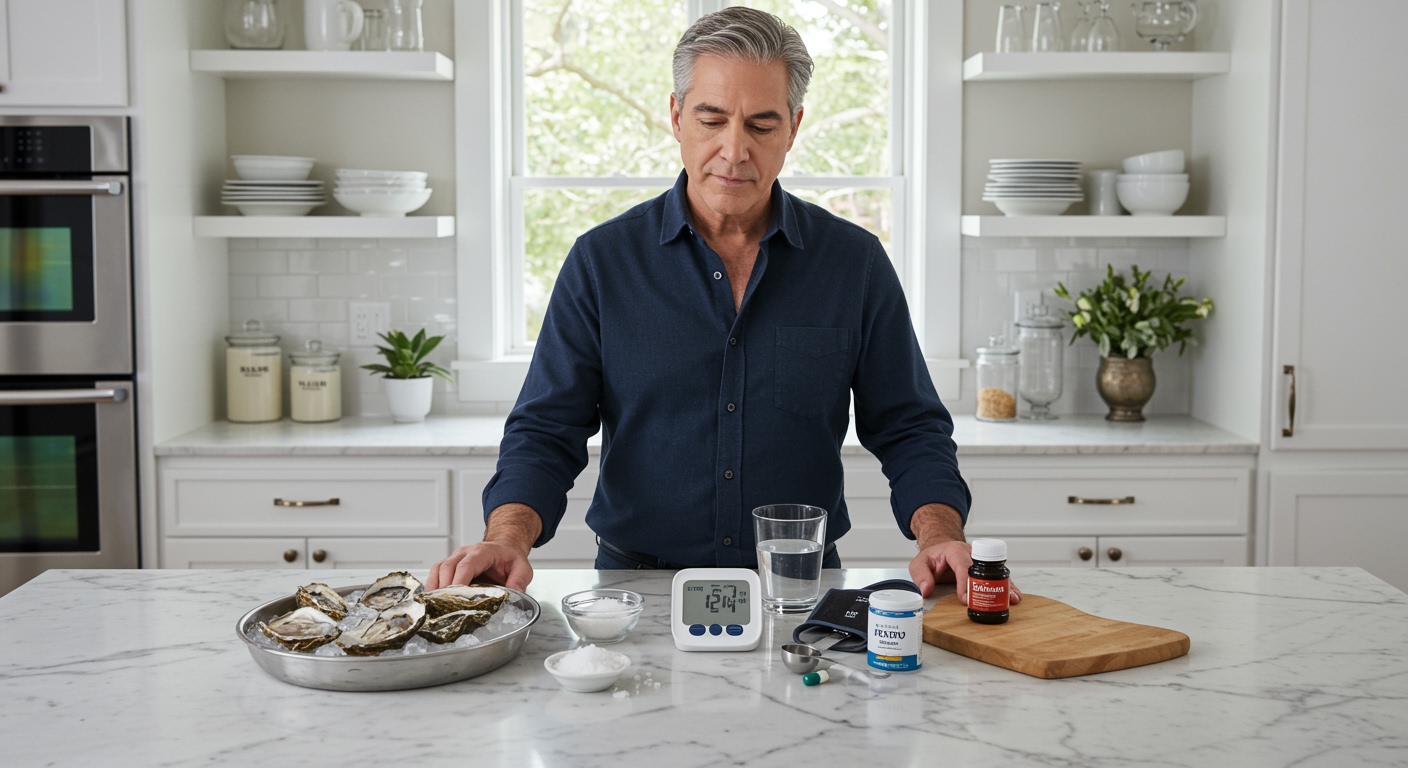✪ Key Takeaway: Oysters can slightly raise blood pressure due to their sodium content, but their minerals may help some people maintain healthy levels.
Introduction
You just heard someone say that eating oysters can help raise blood pressure naturally.
Maybe you have low blood pressure and wonder if these shellfish could be your answer to feeling more energetic and less dizzy.
Hi, I’m Abdur, your nutrition coach and today I’m going to explain exactly how oysters affect your blood pressure and whether they can actually help raise it when you need it most.
What Makes Oysters Affect Blood Pressure?
Oysters contain several compounds that directly influence your cardiovascular system.
The most important factor is their sodium content, which averages about 150-200 milligrams per 100 grams of oyster meat.
This sodium level is moderate compared to other seafood, but it still affects your blood volume and pressure.
When you consume sodium, your kidneys retain more water to maintain the proper sodium-to-water ratio in your bloodstream.
This increased blood volume puts more pressure against your artery walls, which can temporarily raise your blood pressure readings.
However, oysters also contain potassium and magnesium, two minerals that work against sodium’s pressure-raising effects.
These minerals help your blood vessels relax and support healthy circulation patterns throughout your body.
✪ Fact: Six medium oysters contain about the same sodium as one slice of bread.
How Much Can Oysters Raise Your Blood Pressure?
The blood pressure increase from eating oysters is usually mild and temporary.
Most people experience a rise of 2-5 mmHg in systolic pressure within 30-60 minutes after eating a serving of oysters.
This small increase happens because your body processes the sodium and begins retaining slightly more fluid.
The effect typically peaks around one hour after eating and returns to baseline within 2-3 hours for healthy individuals.
People with low blood pressure might notice this small boost helps them feel more alert and reduces symptoms like dizziness or fatigue.
However, the increase is not dramatic enough to be considered a medical treatment for hypotension.
Your individual response depends on factors like your current blood pressure, kidney function, and how much water you drink with the meal.
✪ Pro Tip: Drink water with oysters to help your kidneys process the sodium more efficiently.
Do The Minerals In Oysters Help Blood Pressure?
Oysters are packed with minerals that support healthy blood pressure regulation over time.
They contain exceptionally high levels of zinc, with six oysters providing about 32 milligrams, which is nearly three times your daily requirement.
Zinc helps maintain the structure of your blood vessel walls and supports proper circulation throughout your cardiovascular system.
The magnesium content in oysters helps your blood vessels relax and prevents them from constricting too tightly.
This mineral works like a natural calcium channel blocker, allowing blood to flow more smoothly through your arteries.
Oysters also provide potassium, which helps your kidneys excrete excess sodium and maintain proper fluid balance.
These beneficial minerals can help support healthy blood pressure patterns when oysters are part of a balanced diet over weeks and months.
✪ Note: The mineral benefits of oysters develop gradually with regular consumption, not immediately.
Should You Eat Oysters For Low Blood Pressure?
Oysters can be part of a strategy to support healthy blood pressure, but they should not be your only approach.
If you have chronic low blood pressure, the small sodium boost from oysters might provide temporary relief from symptoms.
However, this effect is too mild and short-lived to replace proper medical management of hypotension.
The real value of oysters lies in their long-term nutritional support for your cardiovascular system.
Regular consumption provides minerals that help maintain healthy blood vessel function and support proper circulation.
People with normal or high blood pressure should be more cautious about eating oysters frequently due to their sodium content.
Always consult with your healthcare provider before using any food as a strategy to manage blood pressure concerns.
✪ Pro Tip: Combine oysters with potassium-rich foods like spinach to balance their sodium impact.
What Are The Risks Of Eating Oysters For Blood Pressure?
While oysters can slightly raise blood pressure, this effect carries some important risks to consider.
People with high blood pressure should limit their oyster consumption because even small increases can be problematic.
The sodium in oysters can worsen hypertension and interfere with blood pressure medications.
Raw oysters also carry the risk of foodborne illness, which can cause dehydration and affect your blood pressure regulation.
Vibrio bacteria and other pathogens in contaminated oysters can lead to serious infections that stress your cardiovascular system.
The high cholesterol content in oysters may also concern people with existing heart disease or circulation problems.
Always choose oysters from reputable sources and consider cooking them if you have any health concerns or compromised immune system.
✪ Note: Pregnant women and immunocompromised individuals should avoid raw oysters completely.
The Bottom Line
Oysters can cause a small, temporary increase in blood pressure due to their sodium content, but this effect is mild and short-lived for most healthy people.
The key to healthy eating is understanding that no single food is a magic solution for complex health issues like blood pressure management.
I would love to hear about your experiences with oysters and blood pressure, or any questions you might have about incorporating seafood into a heart-healthy diet, so please share your thoughts in the comments below.
References
At NutritionCrown, we use quality and credible sources to ensure our content is accurate and trustworthy. Below are the sources referenced in creating this article:
- Frontiers in Bioengineering and Biotechnology: Bioactive Compounds and Health Benefits of Oysters
- PubMed: Sodium Content and Cardiovascular Effects of Shellfish
- PMC: Mineral Content of Marine Foods and Blood Pressure
- MedicineNet: Health Effects of Eating Oysters





